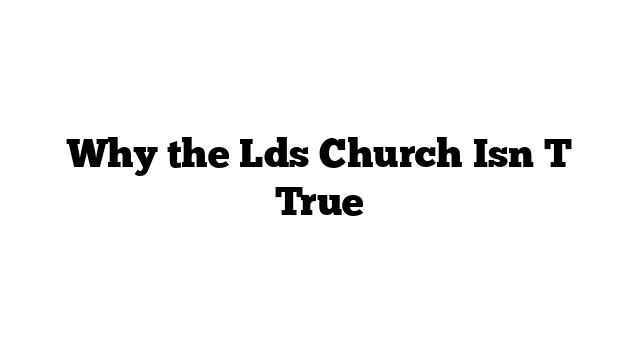Inter-faith & Inter-denomination
To Err is Human: Challenging Assumptions about the LDS Church
Introduction
The Church of Jesus Christ of Latter-Day Saints, commonly known as the LDS Church or the Mormon Church, is a religious institution that has faced its fair share of controversy and skepticism. While it has a large following of faithful members, there are also those who question its truthfulness and validity. In this article, we will examine some of the reasons why people believe that the LDS Church isn’t true. It is important to approach this topic with an open mind and a respectful attitude, as the beliefs of others should be treated with understanding and empathy.
Lack of Evidence for the Book of Mormon
One of the main points raised by those who doubt the truthfulness of the LDS Church is the lack of evidence supporting the authenticity of the Book of Mormon. The Book of Mormon is considered a sacred text by members of the LDS Church and is believed to be translated by the prophet Joseph Smith from ancient golden plates. However, critics argue that there is no concrete archaeological evidence to support the existence of such plates or to verify the historical events described in the book.
Contradictory Doctrines
Another reason why some people believe that the LDS Church isn’t true is the presence of contradictory doctrines within its teachings. For example, some critics point out that the LDS doctrine of Adam and Eve as the first two humans contradicts scientific evidence that suggests the existence of modern humans long before the timeline proposed by the church. This disconnect between religious beliefs and scientific findings can lead to doubt and skepticism among those seeking truth.
Inconsistencies with Joseph Smith’s Claims
Joseph Smith, the founder of the LDS Church, made several claims that are met with skepticism by some. One such claim is the translation of the Book of Abraham from ancient Egyptian papyri. Critics argue that the papyri have been examined by experts who have concluded that they contain common Egyptian funeral texts rather than the story of Abraham. This discrepancy raises questions about the authenticity of Smith’s translation abilities and, by extension, the overall credibility of the LDS Church.
Cultural and Social Issues
Beyond doctrinal disagreements, critics also point to cultural and social issues within the LDS Church as a reason for doubting its truthfulness. Some individuals argue that certain practices or teachings within the church promote harmful ideologies or discriminatory behavior. It is important to note, however, that the actions or beliefs of a few individuals within an organization should not be used to determine the truth or validity of the entire institution.
Conclusion
The question of whether the LDS Church is true or not is deeply personal and subjective. While some individuals may find comfort and guidance within the teachings of the church, others may have reservations or doubts. It is crucial to approach discussions surrounding religion with respect, empathy, and an open mind, recognizing that people hold a wide range of beliefs and experiences.
Ultimately, each person’s journey to finding truth and meaning in their lives is unique, and it is important to support and uplift one another regardless of religious affiliation or belief system.

